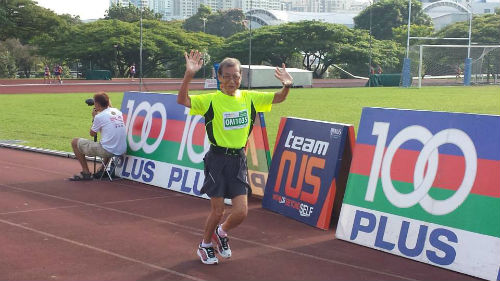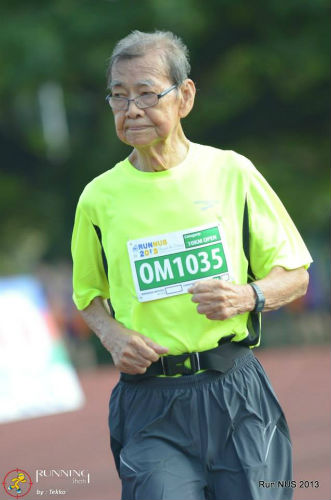What is your secret to staying injury-free when running?
I have actually been quite lucky in terms of injuries. Despite my age, I have had no knee and any other problems related to running. These are my secrets:
I listen to my body
If there are problems, your body will tell you – and you must stop running. For example, if you are very tired or are sweating more than usual, your body is trying to tell you something, so you must stop. Many people collapse and die during races because they push too hard.
Take rest breaks during races
During races if I am feeling more tired than usual I will stop and rest. I will wait for my heartbeat to go down and then start again. I practise this method all the time and so far, I have been quite safe.
Avoid hard surfaces
Do not run too often on a hard surface.
During races, road surfaces are unavoidable, but when you are training, try to do so on soft surfaces and avoid hard ones because they are very bad for your joints. Soft grounds in Singapore would include the seaside, stadium running track and the cross-country trails.
Get a good pair of shoes
Getting a good pair of cushioned shoes also helps to prevent injuries because the shoes can absorb some of the running impact. This is important for my joints and kneecaps.
Get adequate rest
For running, rest is also very important. I run six days a week and make sure I have one day of rest every week. If you rest, your body can run better the next day. If you feel that a single day of rest is not enough, try resting for two days because running every day will cause your body to wear out.
What does your family think of your running?
They think I should not be running. For example, my second son keeps on telling his mother to ask me not to run. He thinks that I should just stay at home because I am 84 and too old to run.
Do your other family members run too?
My oldest son does not like running. He says that running is a form of suffering.
For my second son, he likes to run but he is always so busy and has no time.
But he did take part in a marathon with me once and made sure that I completed the race – by accompanying me.
What tips can you share with readers for doing marathon races?
Many people ask me how I do marathons. It is simple – you just need to keep running.
For an eight-hour target, I will do the race with a run-walk strategy. For example, if the race has lampposts, I will run past post numbers one and two and walk through numbers three and four and so on until I have finished. Sometimes if the event does not have any lampposts, I will use trees – as markers instead.
For a person to do a full marathon in about four or five hours, you will need to build up your mileage. For example, to run a 4-hour marathon, build up mileage per week to about 80km. One day you run 10km and the next day you rest. The third day you run 10km again, and incorporate a 30km run into your training.
How would you advise an older person who wants to pick up running?
Slowly build up mileage
They should ask themselves if their body is able to take it. If not, they should do other exercises that have lesser impact on the joints. But if they still want to run, then slowly build up their mileage. Do not go straight away to run. For many newcomers, they run a very good timing for their first marathon because they do not know the difficulties and want to take on the challenge. But by the second one, they don’t want to run anymore, because they find that it is too tough to do it again.
See a doctor
For older people, it is very important to see a doctor to have a check-up and see if your body can do this. Many people have collapsed during races because they did not have a proper check-up and may have had hidden problems that they were not aware of.
Let the lactic acid go away
Another thing is that after running you should not sit down. You should walk about and let the lactic acid go away. Otherwise, this will build up and you will suffer painful cramps. Once you cross the finishing line, just walk.
Suck in oxygen
When you feel tired too, you should open your mouth, suck in the oxygen and breathe out slowly. Then repeat a few more times and you’ll find you can run more efficiently.
To read more about this inspiring marathon runner, check out his book, “Run For Life” by Chan Meng Hui, one of Singapore’s oldest marathoners – available at most major bookstores.




Leave a Comment